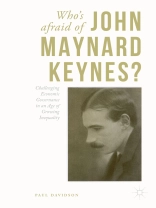This is a book with many benefits. Davidson explains the importance of the market economy, and unveils how and why global financial crises occur when the liquidity of financial assets traded in the market, suddenly collapse.
70 years after Keynes’ death, in another era of financial crisis and economic slump, Keynes’ ideas have made a comeback within economic circles. Yet these ideas are not represented in contemporary government policy decisions. This book explains why Keynes’ ideas need to be used by political parties in order to restore global prosperity and close the gap between income and wealth inequality.
This book will is essential reading for researchers, practitioners, students and the wider public interested in an economic understanding of today’s global economic problems.Cuprins
Chapter 1 – Who saw the coming of the global financial crisis 2007-8?.- .Chapter 2 – Alternative explanations of how the capitalist economy in which we live operates?.- .Chapter 3 – Understanding the role of money and money contracts in a market economy.- .Chapter 4. Unemployment: Why can’t people who want to work find jobs?.- .Chapter 5 – Creating a prosperous full employment economy.- .Chapter 6. Can we prevent inflation and still achieve full employment.- .Chapter 7. The role of financial markets and liquidity.- .Chapter 8. Globalization and international trade effects on employment and prosperity.- .Chapter 9. Are free trade agreements desirable.- .Chapter 10. President Trump’s anti-free trade agreements policy.- .Chapter 11. What economic policies can a democracy adopt to assure we live in a prosperous, civilised, capitalist system.
Despre autor
Professor Paul Davidson is Holly Chair of Excellence in Political Economy, Emeritus, at the University of Tennessee, US. He founded the
Journal of Post Keynesian Economics and. He is also author, co-author, or editor of 22 books including
John Maynard Keynes (Palgrave Macmillan, 2007) and
The Keynes Solution: The Path to Global Economic Prosperity (Palgrave Macmillan, 2009), as well as over 210 articles. He has testified before 20 congressional committees over the years on various economic questions.












